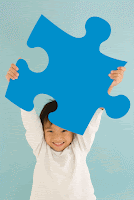
1st of all , I want to clarify that this article is a small part of AUTISM AWARENESS CAMPAIGN by Students` Scientific Society (SSS) ...
I dont prefer to start this article by : " Do you know what is autism ?! " , I think that " Why should I know Autism ?! " or " why we consider it a problem ?! " is a more suitable question !!

The main problem is that NO CURE is known . Children recover occasionally , this occurs sometimes after intensive treatment and sometimes not. Most children with autism lack social support, meaningful relationships, future employment opportunities or self-determination .
A 2004 British study of 68 adults who were diagnosed before 1980 as children with autism with IQ above 50 found that :
12% achieved a high level of independence as adults
10% had some friends and were generally in work but required some support
19% had some independence but were generally living at home and needed considerable support and supervision in daily living

46% needed specialist residential provision from facilities specializing in ASD with a high level of support and very limited autonomy
and 12% needed high-level hospital care.
Postponing treatment may affect long-term outcome & it is now clear that the effects are really serious on both the individual & community levels !!
Another problem is the increasing incidence of autism . About 35 million people worldwide have autism . It`s about 1 in 250 births !!
Consequently , ALL of us should know the early signs of autism & the nature of this disease to be capable of identifying the patients at early time thus ensuring early treatment & better prognosis !!
Now , I think you are a bit interested to take a tour in Autism world . Let`s begin :D
We will begin with the most important part of this article ," How can I know that this child has autism ?! "
The early signs are really VERY important , as they help us to start treatment early & avoid undesired consequenses !!
Any of the following signs is reason to have a child evaluated by a specialist without delay:
* No babbling by 12 months.
* No gesturing (pointing, waving goodbye, etc.) by 12 months.
* No single words by 16 months.
* No two-word spontaneous phrases (other than instances of echolalia) by 24 months.
* Any loss of any language or social skills, at any age.
From all this we can say that autism is disorder of development that results in social interaction problems, communication difficulties, and restrictive or repetitive interests and behaviors.
#Social :
Unusual social development becomes apparent early in childhood. Autistic infants show less attention to social stimuli, smile and look at others less often, and respond less to their own name.
Contrary to a common belief, children with autism do not prefer being alone. Making and maintaining friendships often proves to be difficult for those with autism. For them, the quality of friendships, not the number of friends, predicts how lonely they feel !!
#Communication :
Autistic children are less likely to make requests or share experiences, and are more likely to simply repeat others' words (echolalia)
Joint attention seems to be necessary for functional speech (Joint attention is the process by which one alerts another to a stimulus via nonverbal means, such as gazing or pointing. )
# Repetitive behavior :
Children with autism display many forms of repetitive or restricted behavior such as :
*Stereotypy is repetitive movement, such as hand flapping, making sounds, head rolling, or body rocking.
*Compulsive behavior is intended and appears to follow rules, such as arranging objects in stacks or lines.
*Sameness is resistance to change; for example, insisting that the furniture not be moved or refusing to be interrupted.
* Ritualistic behavior involves an unvarying pattern of daily activities, such as an unchanging menu or a dressing ritual. This is closely associated with sameness and an independent validation has suggested combining the two factors.
*Restricted behavior is limited in focus, interest, or activity, such as preoccupation with a single television program, toy, or game.
It is also noticed that no single repetitive behavior seems to be specific to autism, but only autism appears to have an elevated pattern of occurrence and severity of these behaviors.
by my colleague Dr.Hadeer El-Naggar
للنسخة العربية, انقر هنا








0 التعليقات comments:
إرسال تعليق